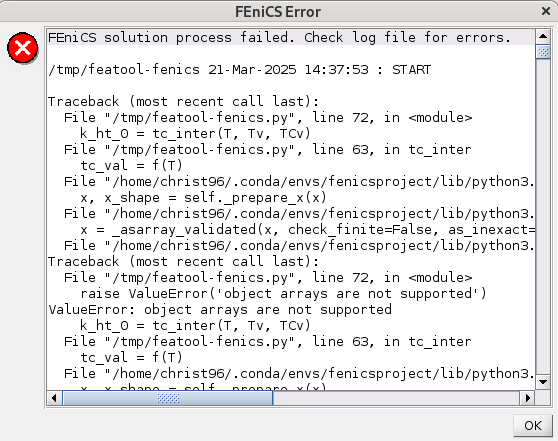Compute PDE parameters via interpolation when using FENICS as solver
Compute PDE parameters via interpolation when using FENICS as solver
|
I am trying to solve the heat transfer equation considering the temperature-dependent thermal conductivity. I have experimental data for the thermal conductivity. I have been trying to interpolate this parameter using the temperature as input and the interpld in Python. However, I am getting the following error when doing this in FENICS.
 I know this error is related to the format of T. How can I convert function type data in FENICS into numpy data, for example, so I can use interpld to interpolate the thermal conductivity? Or is there another way to do this? The Python script is below. # FEATool Multiphysics -> FEniCS project conversion # File featool-fenics.py created 21-Mar-2025 13:22:40 try: from fenics import * except: raise ImportError("Could not find/import fenics.") from timeit import default_timer as timer import atexit comm = MPI.comm_world size = comm.Get_size() rank = comm.Get_rank() # import libraries import pandas as pd from scipy.interpolate import interp1d # read data from txt file tc_matrix = pd.read_csv("/home/christ96/Documents/MATLAB/FEA_TOOLBOX/Data/ThermalCond2.txt") Tv = tc_matrix.iloc[:,0].to_numpy() TCv = tc_matrix.iloc[:,1].to_numpy() # Mesh and subdomains. with HDF5File(comm, "/tmp/featool-fenics.h5", "r") as f: mesh = Mesh() f.read(mesh, "/mesh", False) subd = MeshFunction("size_t", mesh, mesh.topology().dim()) f.read(subd, "/mesh") bdr = MeshFunction("size_t", mesh, mesh.topology().dim()-1) f.read(bdr, "/boundary") dx = Measure("dx", domain=mesh, subdomain_data=subd) ds = Measure("ds", domain=mesh, subdomain_data=bdr) n = FacetNormal(mesh) nz = n[0] nr = n[1] # Finite element spaces. E1 = FiniteElement("P", mesh.ufl_cell(), 1) V = FunctionSpace(mesh, E1) # Function spaces. T = Function(V) T_t = TestFunction(V) T_n = Function(V) # Model constants and expressions. dt = 0.001 tmax = 0.35 t = 0.0 t_i = Expression("t", degree=1, t=0.0) z = Expression("x[0]", degree=1) r = Expression("x[1]", degree=1) h_grid = CellDiameter(mesh) if "CellDiameter" in globals() else CellSize(mesh) # thermal conductivity def tc_inter(T, Tv, TCv): # interpolate f = interp1d(Tv, TCv,kind='cubic') tc_val = f(T) return tc_val rho_ht_0 = Constant(0.8) cp_ht_0 = Constant(7000) u_ht_0 = Constant(0) v_ht_0 = Constant(0) q_ht_0 = Constant(5000000) k_ht_0 = tc_inter(T, Tv, TCv) # Mass forms. m = ((r*rho_ht_0*cp_ht_0)*T*T_t)*dx # Bilinear forms. a = dt*(((r*rho_ht_0*cp_ht_0*u_ht_0)*T.dx(0)*T_t + (r*k_ht_0)*T.dx(0)*T_t.dx(0) + (r*rho_ht_0*cp_ht_0*v_ht_0)*T.dx(1)*T_t + (r*k_ht_0)*T.dx(1)*T_t.dx(1))*dx) # Linear forms. f = ((dt*(r*q_ht_0) + (r*rho_ht_0*cp_ht_0)*T_n)*T_t)*dx # Boundary conditions. dbc0 = DirichletBC(V, Constant(300), bdr, 1) dbc1 = DirichletBC(V, Constant(300), bdr, 2) dbc = [dbc0, dbc1] g = dt*( ((rho_ht_0*cp_ht_0*(nz*u_ht_0+nr*v_ht_0)*T))*T_t*ds(0) + \ ((rho_ht_0*cp_ht_0*(nz*u_ht_0+nr*v_ht_0)*T))*T_t*ds(3) ) # Initial conditions. dvar = ["T"] T_n = project(Constant(5000), V) assign(T, T_n) # Solver parameters. param = { "newton_solver": { "linear_solver": "mumps" if "mumps" in linear_solver_methods() else "default", "preconditioner": "default" if "default" in krylov_solver_preconditioners() else "default", "maximum_iterations": 20, "relaxation_parameter": 1.0, "relative_tolerance": 1e-06, "absolute_tolerance": 1e-06, } } # Solve. f_data = HDF5File(comm, "/tmp/featool-fenics.h5", "a") atexit.register(lambda: f_data.close()) t_start = timer() f_data.write(T, "/" + dvar[0], 0.0) n_ts = int(-(tmax // -dt)) for i_step in range(n_ts): t += dt print("Time step %i, time = %f" % (i_step+1, t)) if rank == 0 else None t_i.t = t f = ((dt*(r*q_ht_0) + (r*rho_ht_0*cp_ht_0)*T_n)*T_t)*dx solve(m + a - f - g == 0, T, dbc, solver_parameters=param) T_n.assign(T) f_data.write(T, "/" + dvar[0], t) t_solve = comm.gather(timer() - t_start) print("t_solve = %g (tot: %g)" % (max(t_solve), sum(t_solve))) if rank == 0 else None |
«
Return to Modeling and Simulation
|
1 view|%1 views
| Free forum by Nabble | Edit this page |

